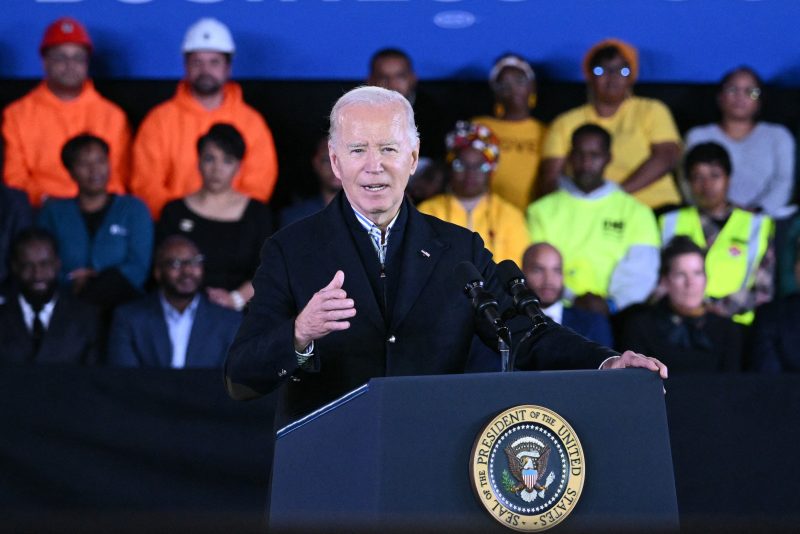
Biden condemns Trump remark that immigrants are ‘poisoning’ America
MILWAUKEE — President Biden on Wednesday condemned former president Donald Trump’s harsh remarks about immigrants, his most public denunciation of his predecessor’s increasingly vitriolic characterization of those seeking to enter the United States.
Speaking in Milwaukee, Biden castigated Trump as “the guy who thinks we’re polluting the blood of America these days.” The remark came in response to Trump’s comment that undocumented immigrants are “poisoning the blood of our country” — a phrase that immigrant groups say is reminiscent of Adolf Hitler’s characterization of Jews and other minorities.
“I don’t believe, as the president — former president — said again yesterday, that immigrants are polluting, polluting our blood,” Biden said while touting his economic policies at the Wisconsin Black Chamber of Commerce. “The economy and our nation are stronger when we’re tapping into the full, full range of talents in this nation.”
Biden’s comments capped a week in which his campaign has repeatedly sounded alarms about Trump’s rhetoric, seeking to bolster its message that the former president’s reelection campaign is a threat to American values and democracy.
After Trump echoed Hitler on Saturday at a rally in New Hampshire, Biden’s campaign noted that Trump also had approvingly quoted Russian President Vladimir Putin, saying he is showing a notable sympathy for ruthless dictators.
Civil rights leaders, historians and others have highlighted Trump’s remarks about blood in particular, noting that, among other things, they echo Hitler’s statement in his book “Mein Kampf,” or “My Struggle,” that Germans should “care for the purity of their own blood” by eliminating Jews.
On Tuesday, Trump said at a rally in Iowa that he has never read “Mein Kampf,” even as he repeated his claim that undocumented immigrants are “destroying the blood of our country.”
“I never read ‘Mein Kampf,’” Trump said. “They said, ‘Oh, Hitler said that.’ In a much different way. Now they’re coming from all over the world. People all over the world. We have no idea. They could be healthy, they could be very unhealthy, they could bring in disease that’s going to catch on in our country. But they do bring in crime.”
Biden previously had denounced Trump’s language about immigrants in more private settings. At a fundraiser in San Francisco last month, for example, he pointed to Trump calling his political opponents “vermin” and arguing that “the blood of America is being poisoned” by immigrants whom he portrayed as threats to Americans.
That “echoes the same phrases used in Nazi Germany,” Biden said. “Folks, we can’t fail. We can’t fail to treat the threat that he poses.”
Biden’s team is increasingly seeking to focus on what it frames as Trump’s authoritarian tendencies. On Wednesday, Biden referred to this week’s decision by the Colorado Supreme Court to bar Trump from running in the state’s presidential primary after it determined that he had engaged in insurrection.
Several Colorado voters had sued to keep Trump off the ballot because of his role in the Jan. 6, 2021, attack on the U.S. Capitol, citing a prohibition in the Constitution’s 14th Amendment against insurrectionists holding federal office.
Asked whether Trump had engaged in insurrection, Biden told reporters, “It’s self-evident — you saw it all. Now, whether the 14th Amendment applies, I’ll let the court make that decision. But he certainly supported an insurrection. There’s no question about it. None. Zero.”
With less than a month to go before the Iowa caucuses, Trump remains the clear polling leader among Republican presidential hopefuls. He has long used harsh and demeaning language to deride immigrants and political opponents, launching his 2016 campaign by calling undocumented immigrants from Mexico “rapists” who brought in “drugs” and “crime.”
But many historians argue that Trump’s rhetoric in his current reelection campaign is veering closer to language used by authoritarians, as the former president compares his targets to insects, toxins or other nonhuman actors.
